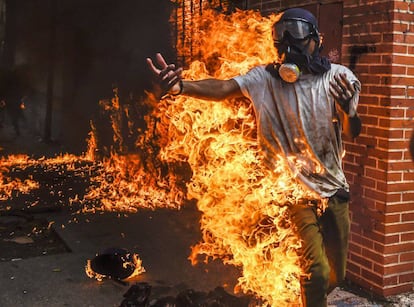Madrid dismisses “kidnapping” of Venezuelan ambassador as “diversion”
President Nicolás Maduro plays up small protest outside Venezuelan cultural center last week
The Spanish government has described the latest comments made by Venezuelan President Nicolás Maduro about Prime Minister Mariano Rajoy as “unacceptable,” and an “insult” and “a smear.” On Friday evening, Maduro called Rajoy a “coward,” accusing him of allowing an alleged “aggression” against the Venezuelan ambassador, Mario Isea, in Madrid, who claims he was “kidnapped.”

The incident that prompted Maduro’s latest outburst took place on May 11, when some 200 people gathered outside the offices of a cultural center run by the Venezuelan government in the Spanish capital to protest human rights violations by the embattled regime in Caracas.
The Spanish authorities had authorized the event until 8 pm, but many demonstrators remained outside the building after that time. Police suggested the ambassador remain inside the building or leave with an escort to avoid incident, which Isea refused to do, instead going on Venezuelan public television, saying: “there has been a kidnapping of the ambassador, of the diplomatic corps in Madrid and of the diplomatic representatives of other countries.”
Rajoy, you cannot allow the Venezuelan embassy to be attacked, that is fascism Venezuelan President Nicolás Maduro
In a statement released on Sunday, the Spanish government said: “At no time was anybody harmed during the event [at the Venezuelan cultural center], which counted on the appropriate police protection,” and that the ambassador of Caracas in Madrid “was in touch at all times with the Ministry of Foreign Affairs.”
“The terms aggression and kidnapping to describe what happened can only be an attempt to divert attention from the deep political crisis Venezuela is enduring, in the face of which Spain calls on the Head of the Executive Power of this fraternal country to offer effective and genuinely democratic solutions to Venezuelans,” said the Spanish government.
Speaking on Venezuelan television, Maduro lambasted the Spanish PM: “We cannot allow ambassadors and embassies to be attacked, this violates the basic human right of co-existence, international law, and Rajoy allowed it,” he said. “Rajoy, you are a coward, you cannot allow an ambassador of any country to be attacked. You cannot allow the Venezuelan embassy to be attacked, that is fascism,” he continued.

After accusing Rajoy, who has been a long-standing supporter of the opposition in Venezuela, of looking for a “fight” with Venezuela, Maduro called on Spain’s King Felipe to launch an investigation into the “aggression” and for “legal punishments” for those who besieged “a sacred diplomatic enclosure, protected by the Vienna Convention.”
Spain has recalled its ambassador to Venezuela twice in the last two years after Maduro insulted Rajoy, but on this occasion its response was limited to a public statement.
At no time was anybody harmed during the event, which had police protection Spanish government statement
The incident comes as the European Union’s Council of General Affairs Council meets on Monday to approve a Spanish proposal calling for an investigation into the deaths of protesters in Venezuela, as well as for political prisoners there to be released, along with a separation of powers and respect for the law, and for a date to be set for general elections.
For the last year, the country has been in the throes of an unprecedented crisis that is hitting it from all sides: it has the highest inflation rate in the world, violence is rampant, people have trouble finding and buying necessary everyday items, and the very fabric of society is breaking down.
English version by Nick Lyne.
Tu suscripción se está usando en otro dispositivo
¿Quieres añadir otro usuario a tu suscripción?
Si continúas leyendo en este dispositivo, no se podrá leer en el otro.
FlechaTu suscripción se está usando en otro dispositivo y solo puedes acceder a EL PAÍS desde un dispositivo a la vez.
Si quieres compartir tu cuenta, cambia tu suscripción a la modalidad Premium, así podrás añadir otro usuario. Cada uno accederá con su propia cuenta de email, lo que os permitirá personalizar vuestra experiencia en EL PAÍS.
¿Tienes una suscripción de empresa? Accede aquí para contratar más cuentas.
En el caso de no saber quién está usando tu cuenta, te recomendamos cambiar tu contraseña aquí.
Si decides continuar compartiendo tu cuenta, este mensaje se mostrará en tu dispositivo y en el de la otra persona que está usando tu cuenta de forma indefinida, afectando a tu experiencia de lectura. Puedes consultar aquí los términos y condiciones de la suscripción digital.









































